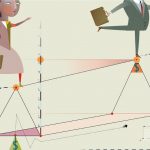After the pay gap, the pandemic gap
After the pay gap, the pandemic gap
Our current health crisis is putting the spotlight on social and economic inequalities throughout the world, and gender inequalities are also in evidence.
Women are primarily the ones providing services that are essential to our lives under COVID-19, and the ones who are bearing the brunt of the pandemic.
Women are present throughout all sectors of the healthcare system, and as service providers they are at higher risk of being infected. This is also the case in businesses that have stayed open even under strict lockdown, such as grocery stores and drug stores. It has been difficult to protect their health on every front. A higher proportion of women have lost their jobs than men. Given their role in ensuring family/work balance and the strain of juggling these responsibilities, they are the ones who have to cope with the ramifications of schools and daycares closing. Some end up using their sick days or taking leave without pay. The call is greater than ever for women’s contribution to keep families on an even keel.
59% of confirmed COVID-19 cases are women.
Women make up a majority of workers in high-risk occupations.
81% of frontline workers in health care and social services (and other essential services) are women.
In March, 120,200 women lost their jobs in Québec compared to 55,100 men, as more women were in precarious work that could not be done from home. Women hold the majority of jobs in sectors that will take longer to recover from the economic crisis (e.g., hotel and restaurant industry, performing arts).
Women bear more of the burden of lockdown measures confining us to our homes (in terms of housework, the strain of family/work responsibilities, home schooling, spousal violence, etc.). A study carried out after Hurricane Katrina in the United States showed that 25% of women had faced spousal violence.
Women’s mental health is jeopardized by the unequal distribution of household and family tasks, and the stress of being exposed to the virus.
For more information, see these articles by the Conseil du statut de la femme (in French).
“Guardian angels” deserve tangible recognition for their role in fighting the pandemic.
Not everyone is happy to be called a “guardian angel.” While the term is presented as a compliment, it is not innocuous. It refers to the idea of vocation, dating from a time when health care was overseen and provided by women in religious orders, before our public system was established. But today, the women we’re talking about are professionals! The era of self-sacrifice may be over, but the fight for pay equity is not. Women working in health and social services deserve to receive due recognition for the value of their work. This is the cornerstone of APTS negotiations with the government that is also employing our members. We need to ditch the “angel” image associated with predominantly female professions.
Hearing the premier say that his plan to relaunch the economy will meet women’s needs thanks to a summer training program for beneficiary attendants, we can only conclude that the absence of women in his economic recovery team is affecting the government’s vision. Women’s determination to achieve gender parity in decision-making positions is not a whim, it’s a democratic necessity. The population’s diversity must be reflected at every level of society. Women’s realities, experience and vision are sorely lacking in the political sphere. This is clearly reflected in comments like the premier’s, which reveal a disturbing ignorance of the issues faced by half the Québec population.
We need to stand our ground and keep the focus on social and economic inequalities – especially since the pandemic has already led to observable setbacks. Now is the time for action to avoid repeating the mistakes of the past.





